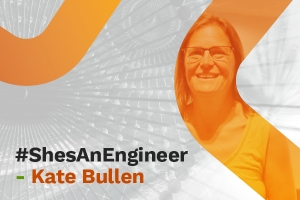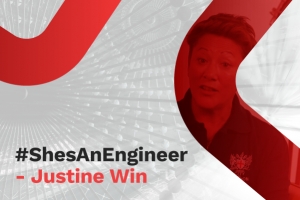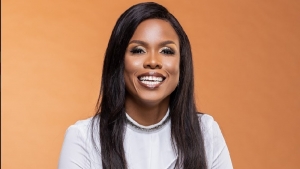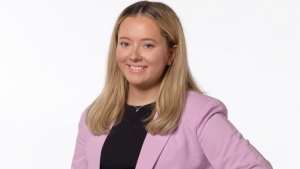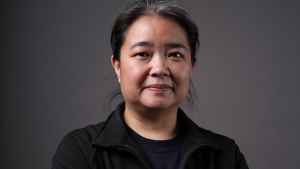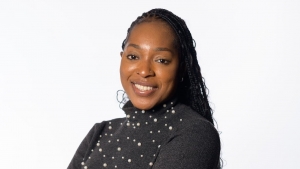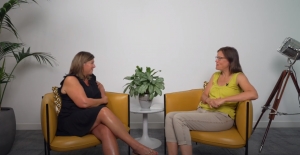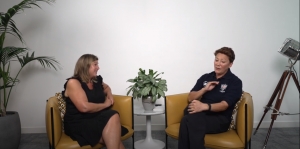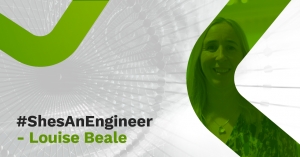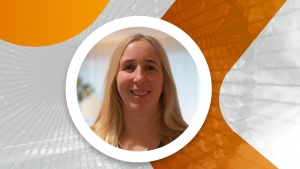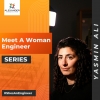Alexander Associates
Kate Bullen
With a passion for the environment and a commitment to workplace diversity, Kate is an inspiration to many. We sat down with Kate to learn more about her journey from a child interested in mechanical toys, to becoming an innovator in her field.
Early Inspirations
From a young age, Kate was interested in practical toys and building. “One of my earliest memories is my dad and I building Meccano…I played with very practical toys from an early age and that was very much encouraged.”As she grew up, Kate recalls becoming passionate about the environment and points to David Attenborough as a key inspiration. “Those sorts of things made me want to do something better for the environment, to make the world a better place.”
She was also grateful for her exceptional physics and maths teachers in school, whose encouragement never made her question whether she wanted to take physics – even if it was a less common subject for girls!
Educational Journey
At school, Kate was initially unsure about what career she wanted to pursue, but has “always been passionate about water and passionate about the environment.”This passion led her to study Environmental Chemistry at university. During her studies, Kate's enthusiasm for water-related subjects intensified. She reflects, “I'd done a huge range of different types of environmental courses and I really, really liked the water ones.” This growing interest also caught the attention of her professors. “The guy in charge of my degree sat me down and suggested I’d be very suitable for taking a masters degree.”
During her master’s, Kate discovered an interest for sewage treatment – and her hands-on experience during her summer at Eastbourne Sewage Works was particularly formative (albeit smelly!). “I spent my summer at Eastbourne Sewage Works looking at fat removal from municipal sewage which, despite being very smelly, I really, really enjoyed and that has set the path of my career.”
Kate’s First Engineering Job
Kate's professional journey began at Bechtel Water, where she was part of a structured graduate programme. “It was approximately 60 graduates a year across the business. So, there were 240 over the whole four-year training programme.”She quickly demonstrated her aptitude for on-site work, noting “They very quickly found out that I was more site material than office material.” She enjoyed being out on site, but also began to experience the effects of gender inequality on-site. “Out on site was the first time I started to feel a bit different.”
Although the presence of female graduates in other departments at Bechtel was reassuring, there weren’t many female engineers around in Kate’s department – in fact, Kate was the only one!
Gender Inequality On-Site
On-site, Kate found that her male colleagues often did not respect her authority. “They struggled to take direction from me. Was it because I was female? Was it because I was very young? I should imagine it was a mixture of both. Was it because I was quite loud and bossy? Possibly that as well.”Despite these challenges, Kate found support among many of her colleagues, who valued her presence and contributions. She reflects, “A lot of the guys quite liked having a woman on site because it's a different sense of humour.”
Transition to Wessex Water and Leadership
After her role at Bechtel Water, Kate moved on to agency work, taking on several different positions. Her expertise and adaptability eventually led her to Wessex Water. “I took an agency position with Wessex Water, to commission chemical dosing plants for phosphorus removal.”She was then offered a job as a staff engineer, working her way up from senior engineer to Commissioning Manager.
Although Kate was hesitant at first – “most engineers I've spoken to don't have any desire to be a people manager, and I certainly didn't” – she quickly found a passion for leadership and management, realising that “a good manager can make a massive difference to somebody's life.”
The Impact of Menopause
One of the drivers for Kate’s transition from engineer to manager was the menopause symptoms she began to experience. “The brain fog for me was the worst thing I've ever experienced, and it threw me. I'd be mid-conversation and my mind would go blank, or I'd be in a meeting with people looking at me and start thinking, oh my goodness, what's wrong with me? And I didn't know that was even a symptom of menopause.”She also suffered from bad fatigue – “What I'd be able to do normally for several days in a row, I'd do it once and it would take three or four days to recover.”
Kate stresses the significance of vocal advocacy and support for women experiencing menopause in the workplace. She described one of the supportive measures implemented in her organisation: “We call them menopause coffee mornings, where you can go along and have a chat about it.”
Empowering Women in Engineering
“I love the idea of doing research,” Kate shares enthusiastically, highlighting her commitment to innovation in her field. “It has to continue because the technology we have at the moment doesn't meet the treatment standards we're going to have to achieve in the future.”She’s also passionate about using her experience and position to empower the next generation of engineers. “Something I feel I'm now able to do, and something I want to do over the next few years, is help people - especially young women, maybe from disadvantaged backgrounds,” she says.
Kate leaves us with this powerful message: “Gender should be the last thing people worry about when they look at where they want to go. Look at your personality, look at your capabilities, look at who you are and what you want to achieve. Never turn around and say, as a woman I don't think I should be doing that.”
Women in engineering are shaping the future of the industry in the UK. If you're looking to explore more opportunities in this field, or would like to access career resources for female engineers, reach out to Alexander Associates – our team of experts would love to help.
Justine Win
Justine Win is a highly respected plumbing mechanical engineer, working for ISS across the schools contract in the City of London. Her career journey has taken many twists and turns and it was only later in life she decided to make this change, and hasn’t looked back!
In this blog, we learn about Justine’s career evolution from working in corporate and hospitality roles, to starting out all over again as a mature-age plumbing apprentice — and thriving as an engineer.
Starting Out in Hospitality Management
After completing her A-levels, Justine completed a degree in institutional management in the 1990s, specialising in hospitality areas such as hotels and catering – an industry she would remain in for “decades”.As the years wore on, she started noticing signs it was time for a change.
Trying on Other Roles for Size
Eager for a fresh start, Justine dipped her toes into recruitment for a few years before realising that industry wasn’t for her, either. “I'm just not a salesperson,” she notes. From there, she tried her hand at office management at BP, before deciding she was ready to try something new.But soon, another challenge appeared on the horizon.
Battling Illness
“I had a period of time when I was unwell, so I had ME [Myalgic Encephalomyelitis/Chronic fatigue syndrome] for three, four years and I was actually wheelchair bound — my life changed,”Justine explains.It was a chapter of her life that was “stressful and daunting”, but helped shift perspective on her professional aspirations. “I just thought, 'life is short, Justine'. I went to a couple of interviews for office management again and I thought, I just can't sell myself here.”
Discovering Her Calling
At this point in her life, Justine considered what aspects of work appealed to her most. “I love hospitality which is hands-on,” she says, and “I don't want to be desk-bound. I enjoy problem solving. I enjoy people”.Ultimately, Justine wanted a career where she could make an immediate impact and enjoy the satisfaction of a job well done whilst steering clear of ‘office politics’ environments.
“And I just said, you know what, I'm going to retrain and I'm going to become a plumber.”
Starting a Plumbing Apprenticeship
Keen to start her pivot into a plumbing career, Justine began with three-month fast track plumbing course whilst working at BP, with the understanding that gaining hands-on work experience would be the biggest challenge.Justine applied to women-only plumbing company Stopcocks, but was told she didn’t have sufficient experience. Fortunately, a colleague at BP discovered Justine’s plans to become a plumber, and said to her “you need to speak to my mate Fred”.
A gruff Irishman in his 60s, Fred was initially reluctant to take on a female apprentice, Justine says. But her determination was obvious, and Fred took her on. “He taught me so much”, she says.
Making Inroads into a New Trade
Working as a plumber’s apprentice was a test of Justine’s resilience and confidence, as she worked with no pay and received no support to succeed. “I did a lot of self-talking to myself, going into work,” she says.“I remember going like, just, you can do this, just be calm, watch and learn and just accept you're not going to get your hands on the tools.”
Justine carefully watched and listened, absorbing all she could about plumbing techniques and know-how. Professionalism — including safety standards — in domestic services environments is less of a concern compared to commercial plumbing work, she notes. But the experience as a domestic plumbing apprentice strengthened her resolve.
The Dynamics of a Male-Dominated Workplace
Working in an all-male environment, Justine said she was referred to on-site as ‘Doris’, simply because she was a woman. Prejudice is still an issue for women in male-dominated workplaces, and is especially prevalent when males group together. “When I was away from Fred, the guys, one-to-one, it was very, very different, with really open conversations [with male colleagues],” she says.Another Door Opens
Eventually Justine was approached by a friend about another apprenticeship opportunity specific for older or female workers. Whilst the timing was seemingly perfect, Justine had put in years of effort just to get her foot in the door. Now was her chance to shine in an engineering role where she could “really start to fly”.The Plumbing Industry is Evolving Fast
There is a real need to change perceptions of disciplines like plumbing to not only attract more women in engineering but young people more broadly.“I think they need to move away from always seeing as engineers hard-hat, high-vis, goggles. Because at the end of the day, people think, oh god, it's a dirty environment I'm working in.
“But if you go into a new building now, everything is operated with [digital] technology. All the valves open with technology,”she says. Far from being a fully manual role, plumbing and related engineering jobs are becoming increasingly digitised.
She adds, “I think it's a fantastic industry and there's so much diversity and scope out there.”
Take The Next Step
Ready to start a new career path in engineering? Our core missions at Alexander Associates are to champion women in engineering and connecting engineers to their ideal roles across the UK. To discuss the broad range of opportunities on offer, contact the team today.
Meet a Woman Engineer - Titi Oliyide
Job Title: Senior Process Safety Engineer
Location: Manchester/London
When did you realise that a career in engineering was right for you? Was there a particular moment in your life?
I became interested in engineering from a young age. As a child, I always asked a lot of questions about why things worked the way they did. One of the things I found fascinating was the cooking process of converting raw ingredients into delicious food.
My fascination and curiosity were encouraged by my very supportive parents and siblings. In school, I also thoroughly enjoyed the logical lessons in maths and physics. Based on my interests and discussions with family and friends, I decided to study chemical engineering at university.
What does an average day look like for you?
No two days are the same! I get involved in a range of activities such as leading hazard identification workshops with a team of engineers from different disciplines, brainstorming potential solutions to mitigate/eliminate hazardous scenarios with my colleagues, or analysing engineering documents to carry out risk assessments or design reviews for safety.
I work in a company that is developing a pioneering electrolyser technology, so there are different challenges to solve on a daily basis! As a safety engineer, it is also important that I have a good overview of the engineering process/system, so I can identify what could go wrong and put measures in place to eliminate/reduce the risk of hazardous scenarios.
Some days, I get invitations to speak to the younger generation to consider STEM careers – I thoroughly enjoy the opportunities to share my excitement about engineering and my engineering career so far.
How did you get into this career? What qualifications did you get?
I studied to obtain a Bachelor’s degree at University of Lagos, Nigeria in Chemical Engineering. Afterwards, I moved to the UK to complete my Master’s degree in advanced chemical engineering (Process Systems specialisation) from Imperial College London.
My journey into process safety engineering began at my first role after my master’s degree, where I worked on safety, risk and reliability assessments for oil and gas facilities. I’ve also achieved professional registration as a Chartered Engineer in September 2022.
Did you face any challenges with your career decision as a woman engineer?
One of the challenges is the misconception is that women are not suited for some (or any!) areas of engineering. This is mainly due to the depiction of engineering in the media. Usually, the first thing that comes to mind when we think of engineering is hard hats and greasy overalls.
While this is part of engineering, other engineering areas exist. This is why I am passionate about demystifying the engineering profession. Engineering is generally about solving societal challenges. As women make up roughly half of the human population, we should be adequately represented in the solutions to these challenges.
What advice would you give to young girls considering a career in engineering?
Boldly explore new opportunities and challenge the status quo. Engineering is a great way to contribute to solving global challenges working with other skilled people in the industry. Despite the prevailing stereotypes, there is no one way an engineer should look like. Seize every opportunity to contribute your unique skills to solving challenges we face in the world today.
Do you have any standout memories/funny/interesting stories from your career as an engineer?
I have quite a few! However, the one that stands out would be the opportunity to ride in a helicopter to an offshore oil and gas facility in the middle of the Atlantic Ocean. This was my first opportunity to see, in real life, various equipment which I had only previously encountered in drawings or videos.
Meet a Woman Engineer - Georgina Andrew
Job Title: Graduate Civil Engineer (Former Civil Engineering Graduate Apprentice)
Location: Based in Aberdeenshire (Design office location: Edinburgh)
When did you realise that a career in engineering was right for you? Was there a particular moment in your life?
Becoming an Engineer wasn’t necessarily something I thought about as a young child probably because I didn’t realise it was an option. It wasn’t until my teenage years that I realised the subjects I enjoyed at School aligned with a career in engineering. These were maths and sciences alongside my passion for art & design. I really enjoyed the structures topic we did in our engineering science class in Secondary School and in 2017 I successfully gained an Arkwright Engineering Scholarship. As part of the scholarship, I was able to go on work experience to a large infrastructure project. I thoroughly enjoyed getting to see some ‘real-life’ civil engineering taking place on-site. A combination of all these experiences made me certain that civil engineering was the right career choice for me.
What does an average day look like for you?
In civil engineering, every day is different. Some days I work remotely, others at the office and sometimes I go out on-site but regardless of this, I start work at 8 am and usually begin by reviewing and replying to emails. I then go through my tasks for the day and check in with my team members at work. My main responsibilities include drafting design drawings, undertaking structural calculations, writing reports, and undertaking project management tasks. I like to make a start on big tasks in the morning then I can use my lunch break to reflect on what I’ve done and re-set my thoughts to continue in the afternoon. My workday usually finishes at 4:30 pm.
How did you get into this career? What qualifications did you get?
I had originally planned on studying civil engineering at University but realised that through a graduate apprenticeship, I could work and gain valuable experience as well as study at the same time. At School, I completed Scottish Higher qualifications in maths, english, physics, engineering science, geography, spanish, and german. I specifically required maths and sciences to get into my Civil Engineering Graduate Apprenticeship University course. I have now completed a BEng (Hons) in Civil Engineering degree through the Graduate Apprenticeship route.
Did you face any challenges with your career decision as a woman engineer?
Personally, I didn’t face any major challenges with my career decision as a woman engineer. I think perceptions that certain careers are solely for males are changing albeit slowly. Some people were surprised when I told them that I was entering a career in engineering however I have been lucky to have a great support network around me who never questioned if it was the right career choice for me as a woman. I do often find myself in situations at work where the room or site is male-dominated but I don’t let this deter me. I am aware that gender disparity in engineering careers is unfortunately still very common and this drives me on as a STEM ambassador to change the perception of career stereotypes.
What advice would you give to young girls considering a career in engineering?
My advice to any young girls considering a career in engineering would be to remain confident with your decision-making ability and take every opportunity that comes your way. It can be easy to shy away from taking on responsibility when you work in a male-dominated environment however you are an engineer because you have the correct skills and qualities to be one so don’t be afraid to show off your great work. Just give everything your best shot!
Do you have any standout memories/funny/interesting stories from your career as an engineer?
A standout memory for me was going on-site during the construction stage to a project that I was the Lead Designer for. I was involved in the project from initiation through to construction so worked on it for a considerable amount of time. It was the first time I had seen something I had designed being constructed out on-site so it was definitely a proud and memorable moment for me.
Meet a Woman Engineer - Siu Mun Li
Job Title: Head of Temporary Works Engineering, Multiplex Construction Europe
Location: London
When did you realise that a career in engineering was right for you? Was there a particular moment in your life?
From a very young age, I followed my dad when he was doing DIY and always wanted to have a go myself. I remember my mum telling my dad not to let me see him using a hammer because I would also want to hammer things but maybe not the right things! I have always had a love of Lego, building things and also taking things apart to see how they worked but I never really knew what an engineer was.
I only realised that a career in engineering was right for me about three months into my first job, I loved it and still love it today!
What does an average day look like for you?
It’s hard to say what an average day looks like because I don’t think I have ever had teo days the same in over 23 years.
The nature of my current role as the Head of Temporary Works Engineering covering all our UK projects requires a lot of communication and liaising with engineers and project teams.
One minute I could be in a co-ordination meeting, the next minute I could be either on a general site visit, providing construction training to future talent or problem-solving site issues that may arise. This is what makes construction and engineering an exciting industry to work in.
How did you get into this career? What qualifications did you get?
I can’t say that I really knew what I wanted to do as a career. I didn’t know what an engineer did when I was choosing my A-Levels but I took a risk on the advice of a family friend who was a civil engineer and said that I would make a good engineer one day.
Based on this and after my A-Levels, I chose to study Civil Engineering at university and came out of university with a Civil Engineering degree.
Did you face any challenges with your career decision as a woman engineer?
My parents were more concerned about my choice of career than I was. As a woman who is short and of an ethnic minority entering a male-dominated industry, I understand their concerns but when I started my career, I was unfazed and thought I could do anything I put my mind to.
There have been challenges throughout my career, I started as the only female on site and men often assumed that I had an admin role as it was very rare to be female and an engineer over 20 years ago. Fortunately, this mindset has shifted, and we have many more amazing female engineers in the industry now.
What advice would you give to young girls considering a career in engineering?
Just do it! You can be whoever you want to be and do whatever you want to do if you have passion, drive and a positive mind.
There are always people around who are more than willing to help and encourage future construction professionals so don’t be afraid to try something new and go after your dreams.
Do you have any standout memories/funny/interesting stories from your career as an engineer?
I have so many funny, amazing and interesting stories and memories from my career as an engineer, where do I start? On my very first project I was on site doing some monitoring and I could see the survey manager setting out some points for construction in the river. It was low tide; his assistant was in the river and he was approximately 100m away.
As his assistant was moving to locate the points, with the soft mud of the riverbed, her feet were slowly getting stuck in the mud to the point that she couldn’t get out. She had to be rescued by the site team and we needed the crane to assist. She came out of the river without her boots as they were stuck fast and to this day, I don’t know if the boots remained in the river or not.
Working on Crossrail, I was responsible for co-ordinating and managing the largest archaeological excavation in Europe (at that time). We excavated 3,500 skeletons from the Bedlam burial ground prior to the construction of the Liverpool Street Crossrail station.
Meet a Woman Engineer - Zainab Adigun
Job Title: Senior Structural Engineer and AFBE-UK Schools Making Engineering Hot
Location: London, United Kingdom
When did you realise that a career in engineering was right for you? Was there a particular moment in your life?
Growing up, I have always been quite intrigued in how things work, I remember my mum always saying if something can’t speak it cannot be smarter than you. That stuck with me as it made me always want to fix things around the house which includes changing a plug socket and getting electrocuted.
I was also really keen on playing outdoors and one day I caught myself staring at my 16-storey tower block which was one of 6 large concrete frame blocks on the council estate I grew up on. I remember saying to myself, how do these things stand up with no support and not even moving…I was intrigued.
Coupled with always wanting to fix things and being really interested in Maths and Science, that sparked the idea in my mind that I wanted to become an engineer. I don’t think at that point I completely understood what an engineer was and even what type of engineer I wanted to be. I just knew it would be fun and it matched my skills set (I’m not a big fan of writing)
Having the opportunity to do a BTEC first engineering course in year 10 changed the trajectory of my career because it further sparked my interest in engineering, but at that point, I still didn’t know which type of engineering I wanted to do.
When I was choosing my A-levels I knew I was going to study civil engineering, but it was at the point I was offered a scholarship to do a master's in structural engineering that I decided that I wanted to be a structural engineer.
What does an average day look like for you?
I manage a small engineering team developing and delivering engineering solutions for our clients.
I am responsible for undertaking structural design and analysis and collaborating with the wider design team coordinating, managing, delegating and implementing structural designs with a range of building requirements.
How did you get into this career? What qualifications did you get?
I had to study Physics and Maths at A-Levels. I studied Civil Engineering at university for my undergraduate degree and then went on to do an MSc in Structural Engineering.
Did you face any challenges with your career decision as a woman engineer?
The main challenge was being asked why I wanted to pursue this career as it is a male-dominated field. I didn’t let that discourage me, it just made me want it even more.
What advice would you give to young girls considering a career in engineering?
You can do it! Do not ever let someone's perception of what the world looks like change yours. It's not as scary as it looks and it's super fun.
Now I can even match my love for acting with my career, as I have featured on science documentaries on channels such as National Geographic.
Do you have any standout memories/funny/interesting stories from your career as an engineer?
I remember, walking into first engineering class where I was the only female and it was very intimidating but I had to remind myself that my gender doesn’t matter, the important thing was that I was there to learn.
Kate Bullen
Justine Win
Louise Beale
The Inspiration for Becoming an Engineer
Louise grew up on a farm in the countryside, so always liked working outdoors. Her favourite subject at school was geography and she’d hoped to follow that subject through to university but didn’t get the A-Levels she wanted. Instead, she chose to study Geology and Geography.“I absolutely loved my degree. Being around the sort of people who were motivated by the same things I was”, she said.
“I got a job after my degree at an environmental consultancy, and I spent all summer wandering around the hills of Shropshire looking for old mine entrances. And I thought this is this is what I want to do.”
Heading Back to University
Encouraged by colleagues during her summer consultancy job, Louise returned to university to complete a Masters in Geochemistry.“My Masters gave me another year of experience, another year being out in the field and lots of opportunities to learn. I think a Masters demonstrates your credentials, that you can write reports, and you can do the analytical processes. I definitely think it is worthwhile.”
Straight after obtaining her Masters, Louise attended a Careers Fair and landed a job at an environmental consultancy. This started her on a career path working in contaminated land assessment that she’s followed for nearly 30 years.
Unearthing New Skills and Passions
Working in contaminated land assessment involves collaborating with clients who have a piece of land or a site they want to buy or develop.“You start by knowing nothing about that piece of dirty derelict land. It’s really grotty, but you do the investigations, you research its history, you look at the potential for contamination, you take samples, and you analyse the data.
“And ultimately, you determine what the problems are and what needs to be done to bring it back to being a safe and beneficial space.
“I really love that process and the feeling that I’m helping to improve the environment”.
Early Inspiration
Louise was lucky enough to start her career in a supportive environment where everyone “mucked in together”.During her second job, following a move to London in 1998, she continued to find role models and someone whom she refers to as “my best boss ever”.
“He had an excellent attitude and was all about doing the right thing, doing it well, and enjoying your work while you did it. He really motivated and encouraged us to be one big team. I think everything I know about leading and managing people, l learned from him.”
“And I was working with a lot of female engineers who were my grade and level of experience. Our team was 50/50 male to female split and we just kept growing as a team because it was such a great place to work.”
Breaking Glass Ceilings
When Louise’s manager and mentor left his role, she decided to apply for it in a job share arrangement with a female engineer colleague. She’d had children by that point and had returned to work three days a week.“There were a lot of us working part-time and the company made it happen around us. It was still very possible to do the site work and the office work around our working hours.”
Louise and her job share partner were offered the role, which was the first time the company had appointed a job share to lead a team.
“It worked brilliantly. We complemented each other so well – we were better than the sum of our parts. I’m a lot better in the mornings, she was better in the evenings. I’m more ‘big picture’, while she had a lot more attention to detail.”
Louise believes that having a family means you learn to work differently. In her experience, before you have children, you focus on whatever hours it takes to get the job done. Whereas afterwards, you have to leave at a certain point in the day, so you become much more efficient.
A New Direction
Louise’s career changed when her company was acquired by another. At nearly 20 years into her career, she thought she was on an ongoing trajectory where she’d be moving up the ladder and taking on more and more senior positions.“I think that was the first realisation I had that it wasn't as straightforward as that,” she said.
“I was applying for a promotion, along with a couple of male colleagues. When they got it and I didn't, I was told it was because I didn't have enough hours in the office. So I was encouraged to increase my days.
“Not long after that I moved on from that company to the company I am at now.”
Managing Menopause
It was around this time Louise became perimenopausal."I cannot believe the impact that it has had on my life in the last two years.”
Louise experienced around 10-12 different symptoms but attributed each to something else in her life. A stressful project, not stretching properly after a run. But poor sleep, anxiety, not being able to multi-task anymore, and aches and pains in her body were taking a toll.
“I got to the point where I lost quite a lot of confidence in myself. I remember I was going into a meeting with a lot of my peers who were all male. And I was scared about saying something stupid. I thought they could all see through me and think that I didn't actually know how to do my job anymore.”
A colleague suggested she speak to another woman in the company who was having similar experiences. Following her advice, Louise decided to speak to a few of her male colleagues about how she was feeling. It was amazing, and she suddenly felt she had permission to be open about it.
Overcoming a Career Plateau
Louise acknowledges there is a correlation between the lack of women in leadership roles and menopause, which she has observed from her own experiences.“I just thought, do I want to do a role and take on extra stress and responsibility? Or do I just reduce my hours, do my job and go home again?” she said.
“I was at the point where I was seriously considering asking for a reduction in hours and accepting this was a this was as good as it was going to get.”
It was only through talking to other people that Louise realised she could get help and there was support available. She believes a lot has changed for the better over the last few years, with more people being open on social media about the impact of menopause.
Her company has embraced this trend and started initiatives such as menopause awareness training for all staff, and management training for supervisors.
“It’s changing and I would love that to be our legacy. People come to our stage in their careers and don’t even have this blip. They recognise early what it is, that there is support in place and not have to think it’s the end of their careers.”
“And what a win that would be — all of these women 20 or 30 years into their careers, staying in the business and moving into a leadership role. With all of that empathy and awareness.”
What’s Next for Louise?
After starting HRT, Louise got her confidence back and applied for the Deputy Chair of the Specialist in Land Condition (SiLC) Professional and Technical Panel. She got it!“SiLC has been around for more than 20 years, but it's historically championed by a lot of senior men in our industry. So when I joined, the current incumbent and I decided we wanted to work hard to increase diversity within SiLC.
“We now have an EDI subcommittee who look at ways to improve diversity within our network, increase membership and demonstrate more value of being a SiLC.”
Interested to learn more about opportunities for female Engineers in the UK? Contact our teamof specialists at Alexander Associates and we’ll connect you with the industry’s best engineering roles. For more inspiring stories on women in engineering, read our articles https://www.alexander-assoc.co.uk/women-in-engineering.
Episode 7 - Louise Beale
As a senior leader within SLR Consulting, Louise has enjoyed a successful career in a highly technical field and is now a champion of women in the workplace, in both early-stage career, and later in life when other challenges present themselves!

